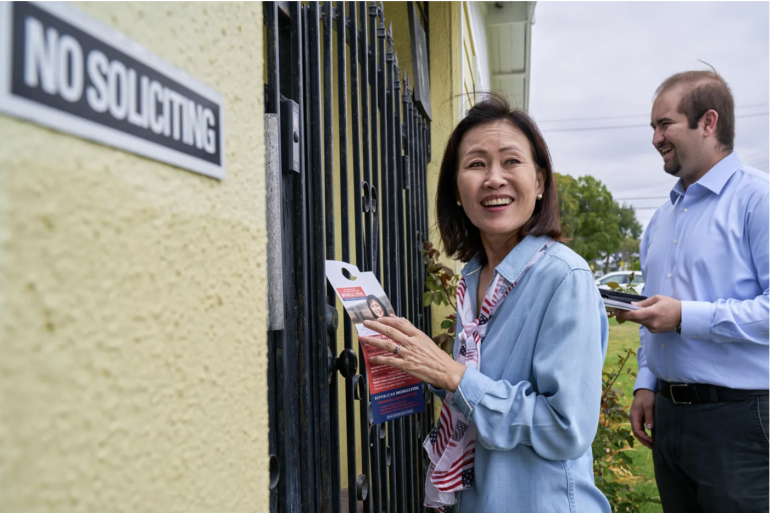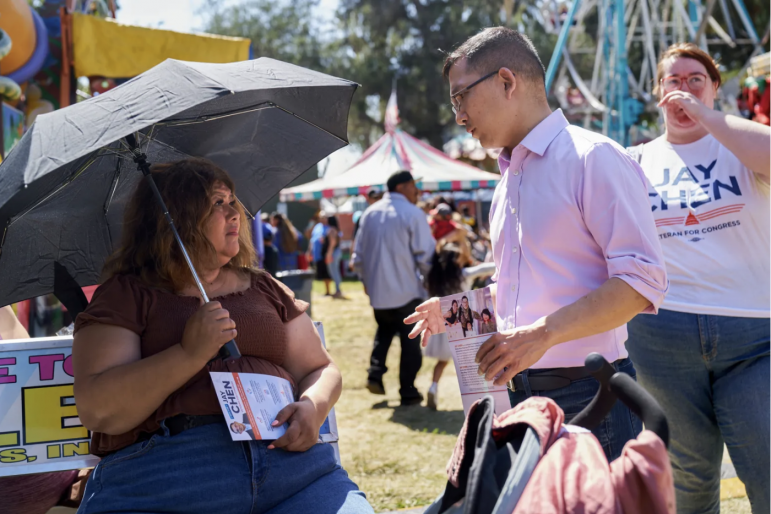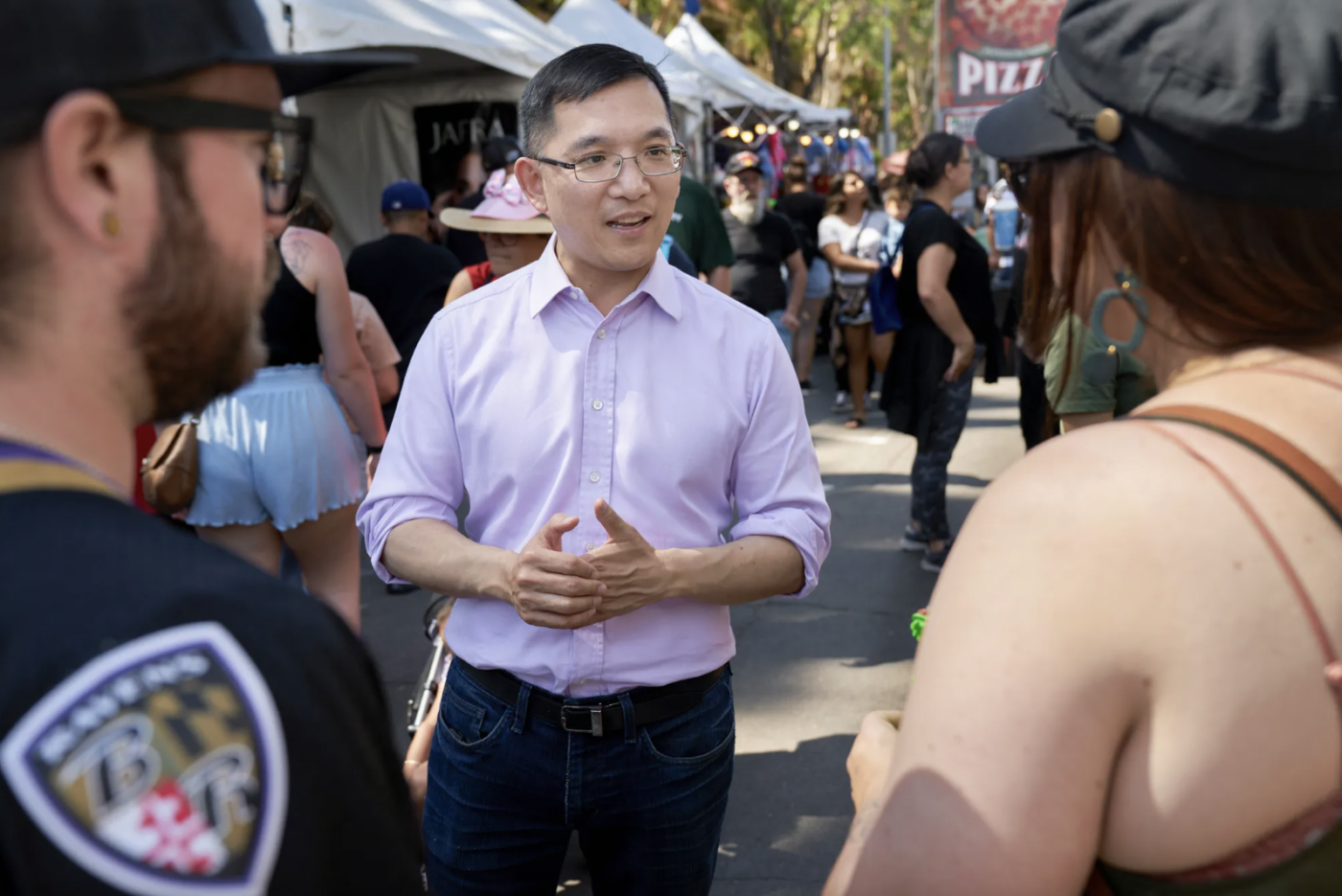Inside an unassuming strip mall storefront, tucked between a tutoring center and a dance studio, a line of children holds hands and glides across the floor beneath a banner of Rep. Michelle Steel praising the United States as the best country on Earth. In exchange for rehearsal space at this Republican Party campaign office in Westminster, the leaders of the Vietnamese dance troupe rehearsing this Saturday evening participate in phone-banking sessions to help the first-term congresswoman from Seal Beach keep her seat.
The following afternoon, her Democratic challenger, Jay Chen, is one of several candidates for local office circulating through a Golden Sea banquet hall in Anaheim during a fundraiser for Viet Tan, an opposition political party banned in Vietnam. Before the lunch service and a lengthy Vietnamese-language presentation featuring a short movie, musical performances, and a raffle, Chen winds through the tables with a translator, bonding with attendees over his service in the Navy’s Seventh Fleet, which rescued refugees fleeing Vietnam in the 1970s.
Their clash in California’s 45th Congressional District, a C-shaped stretch of northwestern Orange County, is one of the most fiercely contested House races in the country amid a midterm election in which Republicans appear poised to take back control of Congress.
It is also one of two seats in Orange County that could come down to a runoff this fall between Asian American candidates — a historically rare occurrence that highlights the fast-growing electorate’s rising political influence and its increasing importance to both parties, in California and nationally.
Asian American voters, who are not an ethnic or political monolith, have drifted overwhelmingly to the Democratic Party over the past few decades, helping turn places such as Orange County, metro Atlanta, and suburban Texas newly competitive.
But the GOP made gains in 2020 and it is now trying to capitalize on issues such as crime and affirmative action to rebuild its connection to the community.
“We have a lot of doctors, we have a lot of scientists coming out of Asian America, but we don’t have a large political voice,” Chen said. He cites the “bamboo ceiling” that drove his Taiwanese immigrant father to leave corporate America and start his own business as a motivating factor for entering politics in 2007, when Chen ran for a local school board.
That an Asian American will represent the district no matter what is “great progress in our community and our country,” Chen said. “I’m proud to be a part of that.”
In the nearby 40th Congressional District, Democrat Asif Mahmood is expected to take on Rep. Young Kim, a Fullerton Republican — as long as she gets past a surprisingly robust primary challenge from fellow conservative Greg Raths.
But Asian American voters will play a particularly important role in the likely race between Steel and Chen, who are vying for one of only a handful of House seats nationwide with an Asian American plurality. About a third of voters in the district are Asian American. In addition to significant Korean, Chinese and Indian neighborhoods, it includes the Little Saigon district straddling Westminster and Garden Grove, the heart of the largest Vietnamese population outside of Vietnam.

The Republican National Committee opened its Westminster office last summer as a joint campaign headquarters and community voter outreach center, the first of several across the country. The Democratic Party has local organizers building relationships and cultivating volunteers in the Taiwanese, Chinese, Vietnamese and Korean communities.
Though both candidates say the race will be decided on broad issues such as inflation and gas prices, Asian American identity has become central to the campaign. As Steel and Chen elevate their biographies to connect with voters, their backgrounds have also become fodder for attacks, leading to accusations of Asian bashing and a simmering tension between them.
Steel said developing personal relationships is especially important in Little Saigon and other tight-knit Asian immigrant communities in Orange County, where trusted local leaders and ethnic media outlets hold considerable sway with voters.
“When they know you, they vote for you. So that’s the reason I’m always out there in the community, that’s the reason I come back every weekend,” she said. “They love you forever when they know you personally.”

Political engagement has historically been much lower than average among Asian Americans. Karthick Ramakrishnan, a professor of public policy at UC Riverside who studies Asian American political behavior, said a lack of targeted mobilization perpetuated a longstanding cycle of low awareness and turnout among Asian American voters that convinced campaigns it was not worth the effort to reach them.
That has shifted in the last decade. After Republican presidential candidate Mitt Romney lost to President Obama in 2012, the GOP embraced a strategy to appeal more to nonwhite voters that boosted candidates including Steel and Kim. Racist rhetoric about China during the coronavirus pandemic from former President Donald Trump and other leaders, plus a recent rise in hate crimes, underscored for many Asian Americans a new urgency to get involved.
The past few election cycles marked an “awakening of the Asian American electorate,” Ramakrishnan said.
In 2018, turnout among Asian American voters increased to 42%, compared to just 28% in 2014, according to the U.S. Current Population Survey. Asian American turnout jumped by more than 10 percentage points between 2016 and 2020, to nearly 60% in the last presidential election, a surge larger than other ethnic groups.
While voter participation by Asian Americans is still lower than white and Black voters — it is slightly higher than among Latinos — the sheer increase has been explosive in California, which saw about 650,000 more Asian Americans cast a ballot in 2020 than in 2016, a surge of 64%.
Though it remains to be seen whether this was an outlier or marks a true shift in Asian American political engagement, Ramakrishnan said he was encouraged by the deep investments in outreach that both parties continue to make in races like the 45th Congressional District.
“The fact that this is happening at the primary stage and not just at the general stage is a hopeful sign,” he said.
With Asian Americans now compromising nearly one in six Californians, the electorate has become too large to ignore.
But Bill Wong, a longtime Democratic political consultant who recently retired, said it took Asian Americans in positions of power, pushing for more sophisticated outreach and engagement, to get campaigns to take the community seriously as a political force.
The 1990s saw the election of the first Asian Americans to the state Legislature in more than a decade. The three members serving in Sacramento in 2001 established the California Asian American and Pacific Islander Legislative Caucus to increase representation; two decades later, there are more than a dozen Asian American members at the Capitol, about a third of them Republican.
Wong pointed to a 2010 independent expenditure committee, funded by organized labor to turn out Asian American voters for Democratic gubernatorial candidate Jerry Brown, as another turning point. At nearly $1 million, it was a relative drop in the bucket of that massively expensive race against Republican Meg Whitman, but comprised perhaps the most significant campaign investment ever to that point aimed at Asian Americans — the result, Wong said, of Asian Americans leading three of California’s largest unions at the time. In the final weeks of the election, Whitman launched her own ad blitz targeting Asian American voters.
“A seat at the table isn’t given. It’s taken,” Wong said.
On a recent Saturday morning, Steel gathered with a group of young volunteers at her campaign headquarters, a largely empty office at a Buena Park strip mall plastered with signs playing to voters’ economic anxieties: Lower taxes! Stop inflation! Gas too high? Register Republican.
Before she dispatched the students to canvass homes in their matching white T-shirts, Steel promised that she would host them for a barbecue after she wins in November: “My barbecue is very famous,” she said.
Running through a suburban neighborhood in the midday sun, knocking on mostly unanswered doors, Steel was eager to discuss an April town hall in which Chen was recorded saying that “you kind of need an interpreter to figure out exactly what she’s saying.” The incident circulated widely, particularly in conservative news outlets. Steel, a Korean immigrant who came to the United States at 19 to continue her education, criticized Chen for mocking her accent.
“My accent is my story,” Steel said, proof of her fulfillment of the American Dream.
She said she continues to practice her English every morning, reading two or three articles out loud to hear her pronunciation. “You work hard and it pays off.”
Chen said he was taking a dig at Steel’s convoluted talking points, not her accent. He slammed Steel for “trying to manufacture a controversy because she doesn’t have a record to run on.”
“It’s sad that she would try to paint herself as a victim when she’s never stood up for the Asian community when it was facing all this hate,” he said. “There are Asian Americans who are being hurt and killed, and she’s taking advantage of that to score cheap political points.”

But Steel has continued to chastise Chen for not apologizing, pointing out that his parents, who came to the United States from Taiwan, are immigrants like her.
“He’s supposed to be really grateful,” Steel said. “All the second, third generations, without first generations’ sacrifice, they’re not there, where they are standing right now.”
At the same time, Steel downplays the significance of her status as one of the few Asian American members of Congress — there are just 15 in the 435-member House of Representatives and two in the 100-member Senate. Rather than representing concerns of the Asian American community that might otherwise be overlooked in policymaking, Steel said the unique perspective she can offer is that of a tax expert.
“Asian voters, their concerns are exactly the same as mainstream,” Steel said. “So what you’re doing is, you just work, but you use a different language.”
Yet she also seems acutely attuned to engaging Asian Americans, especially in a Democratic-leaning district where she may need some crossover support to win a second term.
Among the accomplishments Steel highlighted were legislation she introduced that would require universities receiving federal financial aid to disclose more information about how they use subjective personality traits in admissions decisions, as well as amicus briefs she filed in ongoing lawsuits that contend race-conscious admissions policies at Harvard University and the University of North Carolina-Chapel Hill discriminate against Asian American applicants.
“Asian Americans are very much sensitive about it,” Steel said. “When I introduced these bills…they know that, you know, I am with them. But it’s not just one race that I’m talking about.”
Steel also noted a letter she sent to the International Olympic Committee urging that the 2022 Winter Games be moved out of Beijing. Candidates in Orange County, including Chen, take frequent shots at the Chinese Communist Party to appeal to Vietnamese American voters.
Communism remains a major concern for many residents of Little Saigon, which grew out of the influx of refugees after the fall of South Vietnam in 1975. The community aligned closely with the GOP during the Cold War, though younger generations born in the United States have gravitated towards Democrats as other issues took priority.
That makes Vietnamese Americans a crucial swing demographic in the tightly-divided 45th Congressional District, where they account for about a sixth of all voters. Democrats have a slight advantage among registered voters, who favored President Joe Biden by about 6 percentage points in 2020. But during the last midterm election in 2018, Democratic Gov. Gavin Newsom won the area by less than a point.
“The DNA of the district is very Democratic, but you need to find the right candidates,” said Chen, who connected with attendees at the Viet Tan fundraiser by touting his Taiwanese heritage and their shared concerns about China.

Steel has leaned into the fears about China and communism. Earlier this year, her campaign began promoting a vote that Chen took in 2010 to bring a Chinese language and culture class, paid for by the Chinese government, to a local middle school. Suspicions that the program was an attempt to indoctrinate foreign students with Chinese propaganda fueled an unsuccessful recall attempt against Chen and three of his fellow school board members.
Chen said he has been targeted in recent months by online trolls who spread vitriolic messages that he is a communist or even a Chinese spy. He compared the experience to his first failed bid for Congress in 2012, when some supporters of his white Republican opponent made signs that said, “Vote for the American.”
He lambasted Steel for dividing the Asian American community and “scaremongering” in a manner that could incite violence.
“We just saw what happened in Laguna Woods,” Chen said, where a Chinese American shot members of a Taiwanese congregation last month, allegedly for supporting the island’s independence from China. “It’s a dangerous game.”
Steel is coy about the situation. She said she doesn’t know whether or not Chen is a communist sympathizer and takes no responsibility for the online harassment.
“I’m not saying he’s a commie,” Steel said. “That’s what other people…that’s their thoughts and they are doing it. But you know what, from our campaign, what I’m doing, it’s just one thing that just shows the facts and shows the truth.”
It’s unclear how much any of the controversies or personal connections will matter to voters as gas prices soar past $6 per gallon and a spate of mass shootings has reignited the debate over gun control.
Making the rounds of banquet tables, Chen listened as Uyen Truong, 29, a pharmacist from Westminster, introduced the graduating members of her youth group and where they would be attending college in the fall. After Chen handed her a business card, Truong gave him a sticker with their logo in return.
Truong said she leans Democratic because student loan forgiveness and affordable health care are important to her. Though she had not followed the congressional race closely, she planned to look further into Chen’s campaign after meeting him.
“My community is important to me. So even just showing up means a lot,” she said. “Just the fact that he’s listening to all the voices, it’s important to me.”
As he sat watching the end of the dance practice at the GOP’s Westminster community center, Anthony Cao, 53, who founded the group, said he liked Steel because her parents fled North Korea at the start of the Korean War, fellow refugees from communism: “Her background is a little bit like Vietnamese.”
Cao and his wife, Betty, 50, have identified as Republicans since immigrating to the United States in the late 1980s. They said they could not vote for a Democratic candidate, even one who is Asian American, because they do not believe the party supports policies that help business owners.
Betty Cao said inflation and generous unemployment benefits during the coronavirus have been a double-punch to her husband’s dental practice, which she manages. Their costs have risen sharply, largely from the generous raises they gave their employees to keep up with surging prices, and they have struggled to hire new workers to fill vacancies.
“When I used to put an ad, 20 resumes would come in. Now I put an ad, five people put a resume in, I call them back and I get no answer,” said Betty Cao, who believes many applicants are just pretending to look for a job so they can keep collecting unemployment. “We’re stuck in the middle, just trying to hang in there.”
